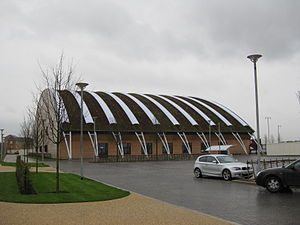 |
| Cambridge City Centre |
Jane Lambert
The British Library Business & IP Centre National Network is a nationwide network of public libraries that are affiliated to the British Library Business and IP Centre. They offer free access to databases, market research, journals, directories and reports worth thousands of pounds and hold free or low-cost events and workshops such as business planning, marketing and intellectual property. The latest libraries to join that network are Cambridge Central Library and Peterborough Central Library.
In Where to get free basic Information on Intellectual Property 18 Dec 2013 NIPC Southeast, I wrote:
"Whatever the nature of your business you are bound to have some intellectual property. It may be a patent for a groundbreaking new invention or it may be something simple like the goodwill that is attached to your business or a secret recipe. Whatever it is you will need some basic information and maybe some advice."I added
"A good place to start is the British Library Business and IP Centre in St Pancras. They have a lot of useful information about business networking, business planning, IP and market research. There is a good introductory video by Anthony Lau who invented a cycle lock and started a business to market his invention. The Centre holds frequent workshops and seminars on all those topics. To access these resources you will need a reader's card which is issued free on production of a passport or driving licence and a utility bill or other evidence of residence. The British Library also has groups on Linkedin and Facebook which you can join on-line."It is still worth visiting the British Library which is located literally next door to St. Pancras and a very short walk from King's Cross, but now many of those resources are close to hand.
Cambridge Central Library offers access to national and international databases of patents and design and trade mark registrations, business and consumer information, reference books, workshops and seminars and facilities for networking. The library hosts occasional IP clinics in its small interview room. These are free 30-minute consultations with local patent attorneys. Contact details and other information is available on the CIPA website.
Peterborough offers access to databases and resources that are similar to those at Cambridge. It also holds workshops and seminars. However, the patent clinic takes place in the offices of Baldwin's a local firm of accountants. Again, particulars are available on the CIPA website.
Local networks that may interest entrepreneurs and other creative and inventive folk in Cambridge and Peterborough include The Cambridge Network and Cambridge Angels. The Cambridge Network describes itself as
"a membership organisation based in the vibrant high technology cluster of Cambridge, UK. We bring people together - from business and academia - to meet and share ideas, encouraging collaboration and partnership for shared success."Cambridge Angels "are a collaborative Cambridge-based group, actively mentoring and investing in innovative entrepreneurial teams and their ideas, to achieve returns and help realise their full potential. We have a strong ethos of backing merit and supporting entrepreneurship." Information about private equity and venture capital investors is available on the Business Investors and Funding Networks page of the Cambridgeshire County Council website.
Anybody from the East of England wishing to discuss this article or IP for business startups generally may call me on 020 7404 5252 during office hours or send me a message through my contact page.





